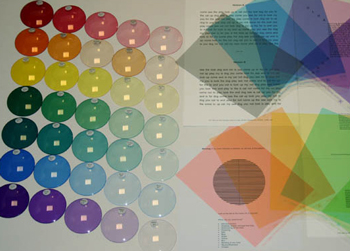
Colorimetry & Medical Tints
These assessments are suitable for those suffering from a variety of symptoms and signs related to visual fatigue and perception distortions. Some people can experience distortions when they look at certain materials, particularly text. The distortions of text can include blurring, movement of letters, words doubling, shadowy lines, shapes or colours on the page. Those who may benefit from this specialist service include light induced migraine, light induced epilepsy sufferers as well as patients with suspected dyslexia or dyspraxia. (Cerium tints / overlays)
Overlay Assessments, Colorimetry, Dyslexia, Photosensitive Migraine & Epilepsy
If you suffer from Dyslexia, Dyspraxia, Migraines or Epilepsy which are caused by sensitivity to light you may benefit from an assessment with for coloured Overlay assessments & Intuitive Colorimetry.
Difficulties at school: is it dyslexia?
People with specific learning difficulties have problems with certain skills at school. The most common type of specific learning difficulty is a difficulty with reading and spelling; and this is often called dyslexia.
Dyslexic people may be highly intelligent in conversation, but have trouble with written language. Leonardo da Vinci and Einstein are both believed to have been dyslexic.
The term dyslexia is usually reserved for a severe degree of reading difficulty. Dyslexia is best diagnosed by an educational psychologist or qualified specialist teacher. Assessments that may lead to such a diagnosis can be arranged through your school, or privately. Optometrists do not diagnose dyslexia, but they detect visual problems that can contribute to reading difficulties, including dyslexia.
The term dyslexia is used throughout, but the visual problems that are described can also be present in children who have other, non-dyslexic, difficulties at school, including dyspraxia. A person does not have to be diagnosed as dyslexic in order to benefit from the tests outlined here.
Visual factors and school difficulties
Most experts agree that problems with sight are not usually a main cause of dyslexia. Certain visual problems, however, do occur more often in dyslexia and these may, in some cases, contribute to the reading difficulty.
These visual problems would not normally be detected in a standard sight test. Two of the most common visual anomalies in dyslexia are poor or unstable co-ordination of the two eyes (binocular instability) and a reduced ability to focus close to.
These visual problems can cause eyestrain, visual distortions, or headaches. This may slow reading and discourage children from prolonged reading.
Not all dyslexic people have these visual problems, but some have visual anomalies without realising it. People with a mild specific learning difficulty, perhaps not bad enough to be called dyslexia, can also have these visual problems. The visual problems can usually be treated with simple eye exercises. In some cases, glasses may be required.
An eye examination with an optometrist will not be able to diagnose dyslexia. But if dyslexia is suspected then it is sensible to start by investigating whether the visual function is normal.
Our Eyecare for Dyslexic People
Williams Optometrists sees patients at the practice to carry out a full eye examination any additional tests to look for the visual problems that may be associated with difficulties at school can be carried out at specialist practices. The eye examination may be covered through the NHS if exemptions apply, specialised assessments are not usually covered through the NHS.
Coloured Lenses and Learning
Some people with difficulties at school benefit from coloured filters. This has been called Meares-Irlen Syndrome, Visual Stress, or Scotopic Sensitivity Syndrome.
Continuing Care
For patients who are prescribed Precision Tinted lenses the exact colour of tint that is required can, like any other optical prescription, change over time. Therefore, usually repeat testing with the intuitive colorimeter at yearly intervals should be performed.
Useful Addresses
The British Dyslexia Association is a support group which can give information on the legal situation concerning learning difficulties and legislation on education. Their website is
Dyslexia Action has many local offices where psychologists can assess learning difficulties and specially trained teachers can help to overcome these problems. Their website is
Medical Tints
Our qualified dispensing optician Natasha has a wealth of knowledge and can advise on medical tints to help with eye conditions such as Macular Degeneration, Glaucoma & Retinitis Pigmentosa. They can also advise on how to reduce your chances of early onset of Cataracts and UV damage.
